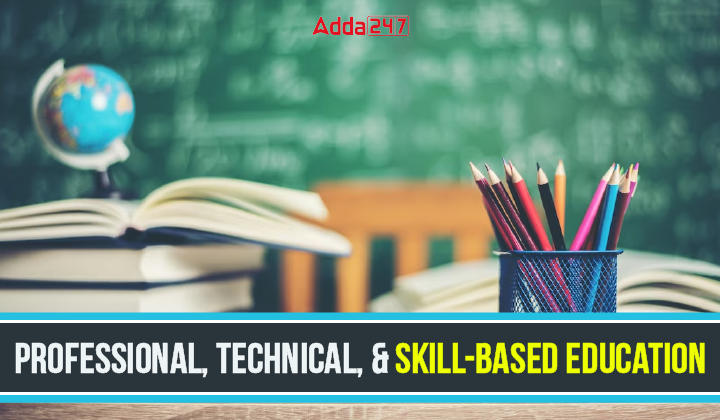Table of Contents
Professional, Technical, and Skill-based Education play crucial roles in equipping individuals with the knowledge and competencies needed to excel in specific fields or industries. Professional, Technical, and Skill-based Education focuses on providing individuals with the specific knowledge, skills, and abilities needed for particular jobs, industries, or trades. Unlike traditional academic education, which is often more theoretical, these types of education emphasize practical experience and real-world applications. They prepare people to enter the workforce with hands-on skills and specialized training, making them ready to excel in their chosen fields from the get-go.
Professional Education
Professional education focuses on preparing individuals for specific professions or occupations. It typically includes programs such as law, medicine, engineering, teaching, accounting, and management. Professional education combines theoretical knowledge with practical training to develop the skills and expertise necessary to succeed in a particular career.
Essence of Professional Education
- In professional education, students gain a deep understanding of the foundational principles, theories, and best practices of their chosen field.
- They often study core subjects and specialized areas, taking courses directly related to their intended profession.
- Professional education programs also emphasize practical experiences such as internships, clinical rotations, or apprenticeships, enabling students to apply their knowledge in real-world settings.
Examples of Professional Education
- Law School: Students pursue a Juris Doctor (J.D.) degree to become lawyers, studying subjects such as constitutional law, criminal law, and contracts. They also engage in moot court simulations and internships at law firms.
- Medical School: Aspiring doctors attend medical school to earn a Doctor of Medicine (M.D.) degree. They study anatomy, physiology, and pharmacology, and gain clinical experience through rotations in hospitals and clinics.
- Business School: Individuals seeking careers in business may pursue a Master of Business Administration (MBA) degree. They learn about finance, marketing, operations, and leadership through coursework and case studies.
Technical Education
Technical education focuses on imparting specialized knowledge and skills required for specific technical or vocational occupations. It includes fields such as information technology, electronics, automotive technology, plumbing, welding, and culinary arts. Technical education equips individuals with hands-on expertise and practical skills relevant to their chosen trade.
Power of Technical Education
- Technical education programs often blend classroom instruction with extensive practical training.
- Students learn to operate specialized tools, machinery, or software relevant to their field.
- These programs emphasize skill development, problem-solving, and critical thinking to address real-world challenges.
- Technical education can lead to certifications, diplomas, or associate degrees, enabling individuals to enter the workforce quickly or pursue further education.
Examples of Technical Education
- Information Technology: Students enrol in a technical college or vocational school to obtain certifications in computer networking, cybersecurity, or software development. They learn programming languages, and networking protocols, and gain practical experience through lab exercises.
- Culinary Arts: Aspiring chefs attend culinary schools to learn cooking techniques, food preparation, and menu planning. They acquire hands-on experience in commercial kitchens, mastering culinary skills such as knife handling and flavour combinations.
- Automotive Technology: Individuals interested in automotive repair and maintenance can attend technical programs that offer courses on engine repair, electrical systems, and diagnostics. They gain practical skills by working on vehicles in workshops or apprenticeships.
Skill-based Education
Skill-based education focuses on developing specific skills and competencies necessary for a wide range of professions and industries. It aims to enhance practical abilities such as communication, teamwork, problem-solving, adaptability, leadership, and critical thinking. Skill-based education is often seen as complementary to academic or theoretical education.
Essence of Skill-based Education
- Skill-based education programs encompass various areas, including communication skills, interpersonal skills, time management, project management, sales and marketing skills, entrepreneurship, and digital literacy.
- These programs employ interactive teaching methods such as workshops, simulations, case studies, and hands-on exercises to foster skill acquisition.
- Skill-based education is essential for career advancement, professional growth, and adaptability in a rapidly changing job market.
Examples of Skill-based Education
- Communication Skills: Workshops and courses are available to improve public speaking, presentation skills, and effective written communication. These programs help individuals express ideas clearly, build rapport, and convey information persuasively.
- Project Management: Training programs teach individuals how to plan, execute, and monitor projects effectively. They learn skills like defining project scope, creating schedules, managing resources, and mitigating risks.
- Digital Marketing: Skill-based education in digital marketing covers topics like search engine optimization (SEO), social media marketing, and content creation. Participants gain practical knowledge of online advertising platforms and strategies to enhance brand visibility.
Conclusion
In summary, professional, technical, and skill-based education all serve distinct purposes in preparing individuals for specific careers or enhancing their employability. Whether it’s acquiring specialized knowledge, developing technical expertise, or honing practical skills, these forms of education contribute to individuals’ professional growth and success in their chosen fields.
Download Professional, Technical, and Skill-based Education Study Notes PDF
The direct Link to download the Professional, Technical, and Skill-based Education Study Notes PDF has been provided below. Check Here for UGC NET Paper 1 Study Notes PDF Section wise for NET Exam preparation.
Download Professional, Technical, and Skill-based Education Study Notes PDF




 UGC NET Study Notes for Paper 1, Downloa...
UGC NET Study Notes for Paper 1, Downloa...
 समुद्र का पर्य�...
समुद्र का पर्य�...
 उपमा अलंकार: पर�...
उपमा अलंकार: पर�...














